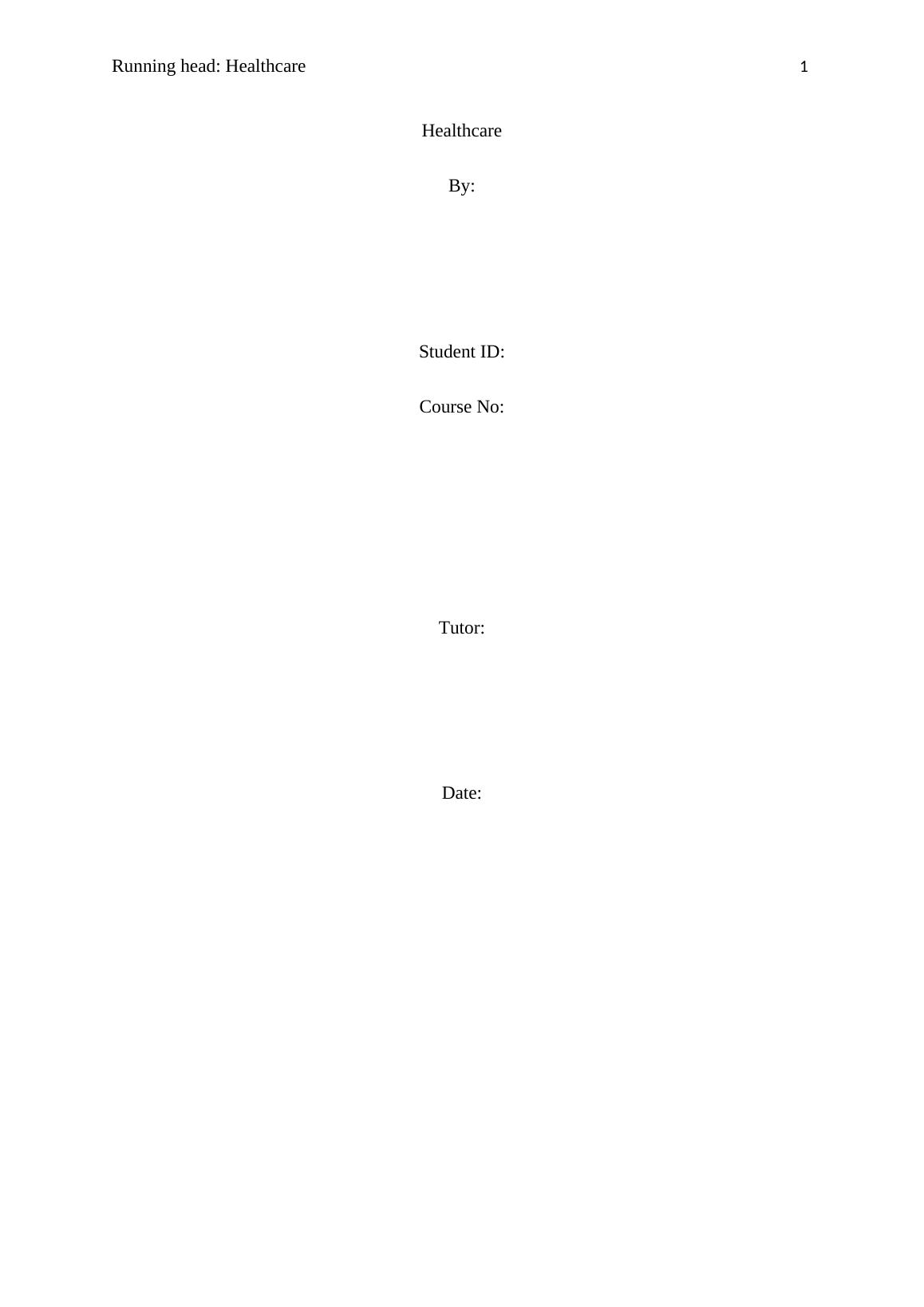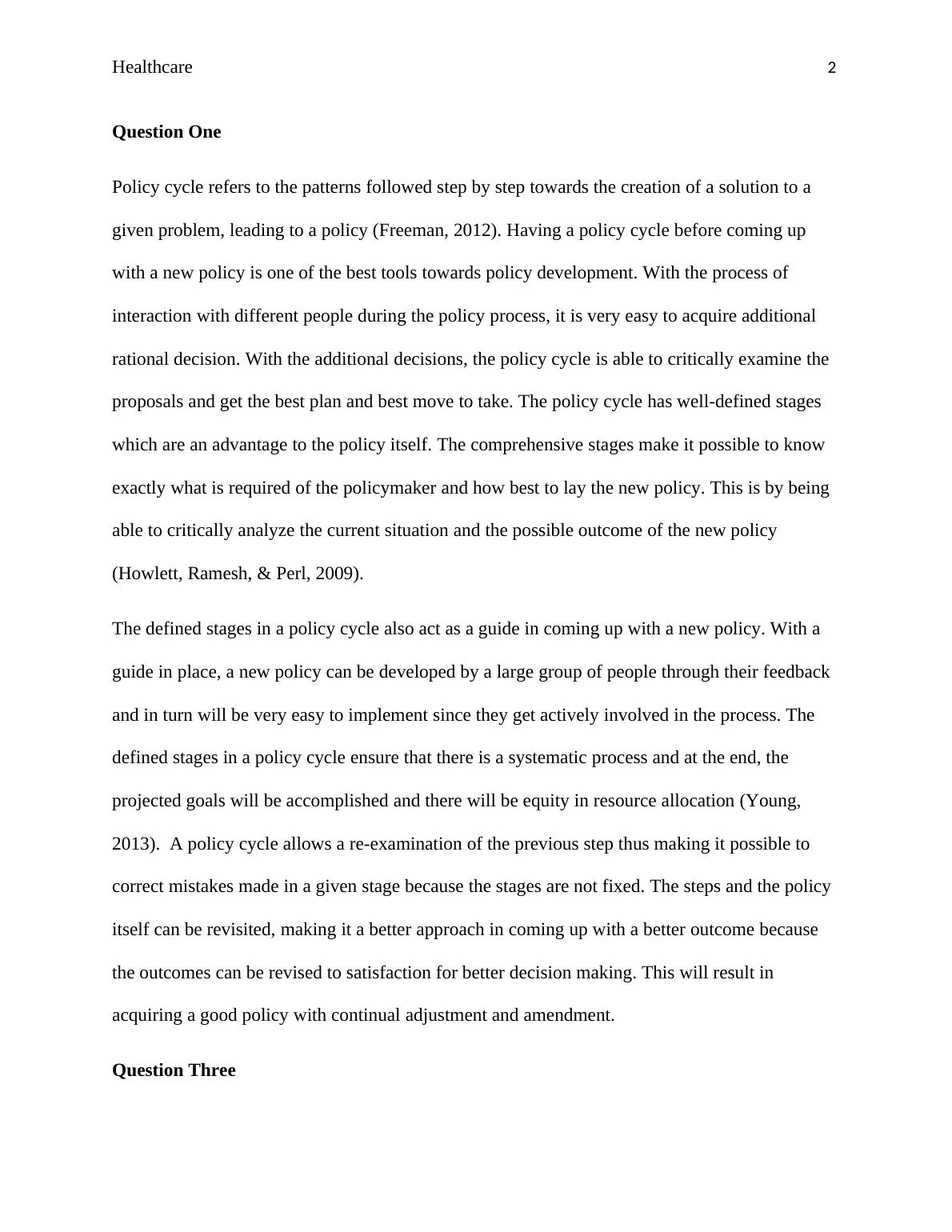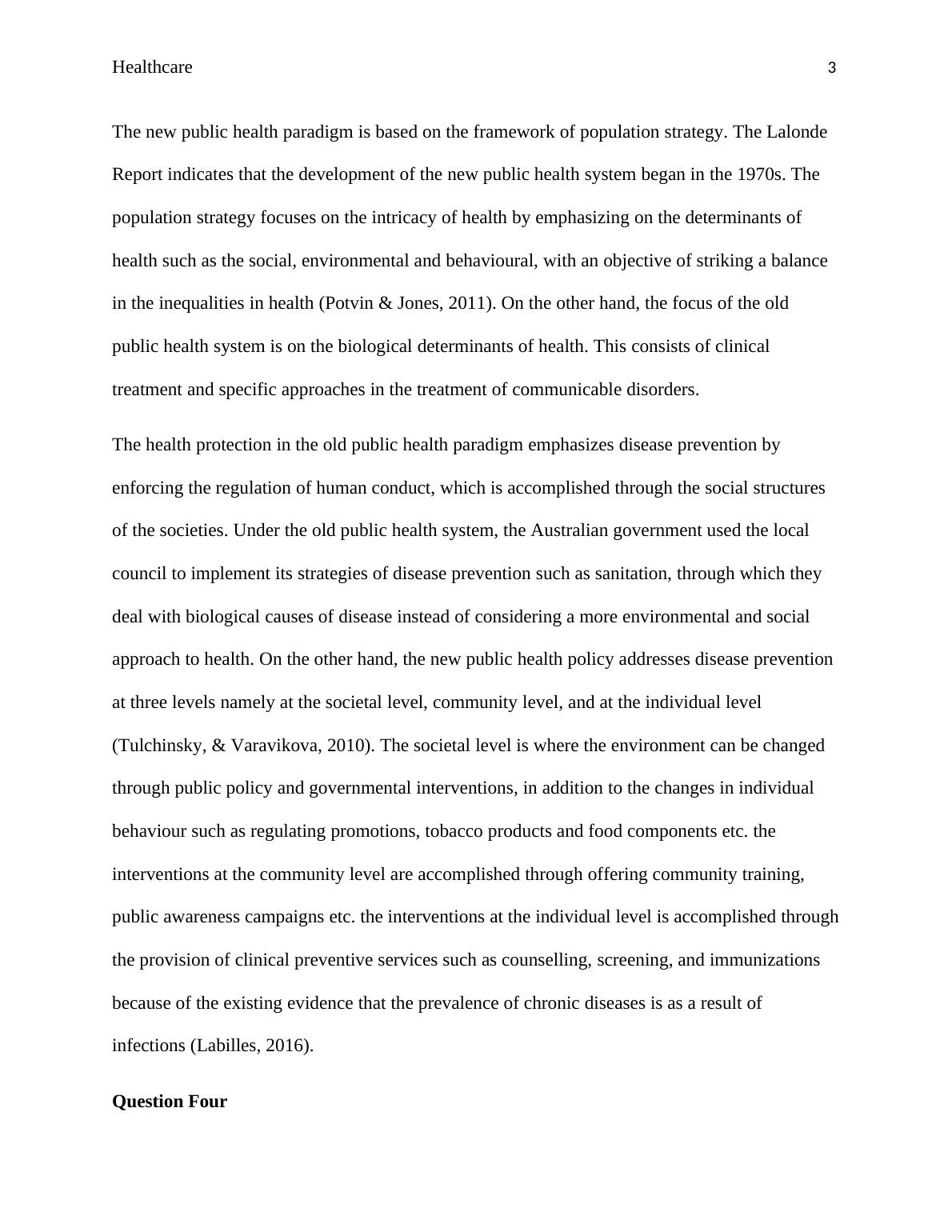Policy Cycle and its Importance in Policy Development
Added on 2023-04-06
8 Pages1822 Words468 Views
Running head: Healthcare 1
Healthcare
By:
Student ID:
Course No:
Tutor:
Date:
Healthcare
By:
Student ID:
Course No:
Tutor:
Date:

Healthcare 2
Question One
Policy cycle refers to the patterns followed step by step towards the creation of a solution to a
given problem, leading to a policy (Freeman, 2012). Having a policy cycle before coming up
with a new policy is one of the best tools towards policy development. With the process of
interaction with different people during the policy process, it is very easy to acquire additional
rational decision. With the additional decisions, the policy cycle is able to critically examine the
proposals and get the best plan and best move to take. The policy cycle has well-defined stages
which are an advantage to the policy itself. The comprehensive stages make it possible to know
exactly what is required of the policymaker and how best to lay the new policy. This is by being
able to critically analyze the current situation and the possible outcome of the new policy
(Howlett, Ramesh, & Perl, 2009).
The defined stages in a policy cycle also act as a guide in coming up with a new policy. With a
guide in place, a new policy can be developed by a large group of people through their feedback
and in turn will be very easy to implement since they get actively involved in the process. The
defined stages in a policy cycle ensure that there is a systematic process and at the end, the
projected goals will be accomplished and there will be equity in resource allocation (Young,
2013). A policy cycle allows a re-examination of the previous step thus making it possible to
correct mistakes made in a given stage because the stages are not fixed. The steps and the policy
itself can be revisited, making it a better approach in coming up with a better outcome because
the outcomes can be revised to satisfaction for better decision making. This will result in
acquiring a good policy with continual adjustment and amendment.
Question Three
Question One
Policy cycle refers to the patterns followed step by step towards the creation of a solution to a
given problem, leading to a policy (Freeman, 2012). Having a policy cycle before coming up
with a new policy is one of the best tools towards policy development. With the process of
interaction with different people during the policy process, it is very easy to acquire additional
rational decision. With the additional decisions, the policy cycle is able to critically examine the
proposals and get the best plan and best move to take. The policy cycle has well-defined stages
which are an advantage to the policy itself. The comprehensive stages make it possible to know
exactly what is required of the policymaker and how best to lay the new policy. This is by being
able to critically analyze the current situation and the possible outcome of the new policy
(Howlett, Ramesh, & Perl, 2009).
The defined stages in a policy cycle also act as a guide in coming up with a new policy. With a
guide in place, a new policy can be developed by a large group of people through their feedback
and in turn will be very easy to implement since they get actively involved in the process. The
defined stages in a policy cycle ensure that there is a systematic process and at the end, the
projected goals will be accomplished and there will be equity in resource allocation (Young,
2013). A policy cycle allows a re-examination of the previous step thus making it possible to
correct mistakes made in a given stage because the stages are not fixed. The steps and the policy
itself can be revisited, making it a better approach in coming up with a better outcome because
the outcomes can be revised to satisfaction for better decision making. This will result in
acquiring a good policy with continual adjustment and amendment.
Question Three

Healthcare 3
The new public health paradigm is based on the framework of population strategy. The Lalonde
Report indicates that the development of the new public health system began in the 1970s. The
population strategy focuses on the intricacy of health by emphasizing on the determinants of
health such as the social, environmental and behavioural, with an objective of striking a balance
in the inequalities in health (Potvin & Jones, 2011). On the other hand, the focus of the old
public health system is on the biological determinants of health. This consists of clinical
treatment and specific approaches in the treatment of communicable disorders.
The health protection in the old public health paradigm emphasizes disease prevention by
enforcing the regulation of human conduct, which is accomplished through the social structures
of the societies. Under the old public health system, the Australian government used the local
council to implement its strategies of disease prevention such as sanitation, through which they
deal with biological causes of disease instead of considering a more environmental and social
approach to health. On the other hand, the new public health policy addresses disease prevention
at three levels namely at the societal level, community level, and at the individual level
(Tulchinsky, & Varavikova, 2010). The societal level is where the environment can be changed
through public policy and governmental interventions, in addition to the changes in individual
behaviour such as regulating promotions, tobacco products and food components etc. the
interventions at the community level are accomplished through offering community training,
public awareness campaigns etc. the interventions at the individual level is accomplished through
the provision of clinical preventive services such as counselling, screening, and immunizations
because of the existing evidence that the prevalence of chronic diseases is as a result of
infections (Labilles, 2016).
Question Four
The new public health paradigm is based on the framework of population strategy. The Lalonde
Report indicates that the development of the new public health system began in the 1970s. The
population strategy focuses on the intricacy of health by emphasizing on the determinants of
health such as the social, environmental and behavioural, with an objective of striking a balance
in the inequalities in health (Potvin & Jones, 2011). On the other hand, the focus of the old
public health system is on the biological determinants of health. This consists of clinical
treatment and specific approaches in the treatment of communicable disorders.
The health protection in the old public health paradigm emphasizes disease prevention by
enforcing the regulation of human conduct, which is accomplished through the social structures
of the societies. Under the old public health system, the Australian government used the local
council to implement its strategies of disease prevention such as sanitation, through which they
deal with biological causes of disease instead of considering a more environmental and social
approach to health. On the other hand, the new public health policy addresses disease prevention
at three levels namely at the societal level, community level, and at the individual level
(Tulchinsky, & Varavikova, 2010). The societal level is where the environment can be changed
through public policy and governmental interventions, in addition to the changes in individual
behaviour such as regulating promotions, tobacco products and food components etc. the
interventions at the community level are accomplished through offering community training,
public awareness campaigns etc. the interventions at the individual level is accomplished through
the provision of clinical preventive services such as counselling, screening, and immunizations
because of the existing evidence that the prevalence of chronic diseases is as a result of
infections (Labilles, 2016).
Question Four

End of preview
Want to access all the pages? Upload your documents or become a member.
Related Documents
Policy, Power and Politics in Health Care Provisionlg...
|11
|3070
|387
Policy Cycle and its Importance in Developing New Policylg...
|6
|2064
|56
National Health Policieslg...
|8
|1965
|17
Policy, Power and Politics in Health Care Provisionlg...
|9
|2321
|1
Policy, Power & Politics in Health Care Provisionlg...
|7
|2641
|50
Compulsory Computerized Physician Order Entry Policy for Healthcare Staffslg...
|4
|1133
|67
